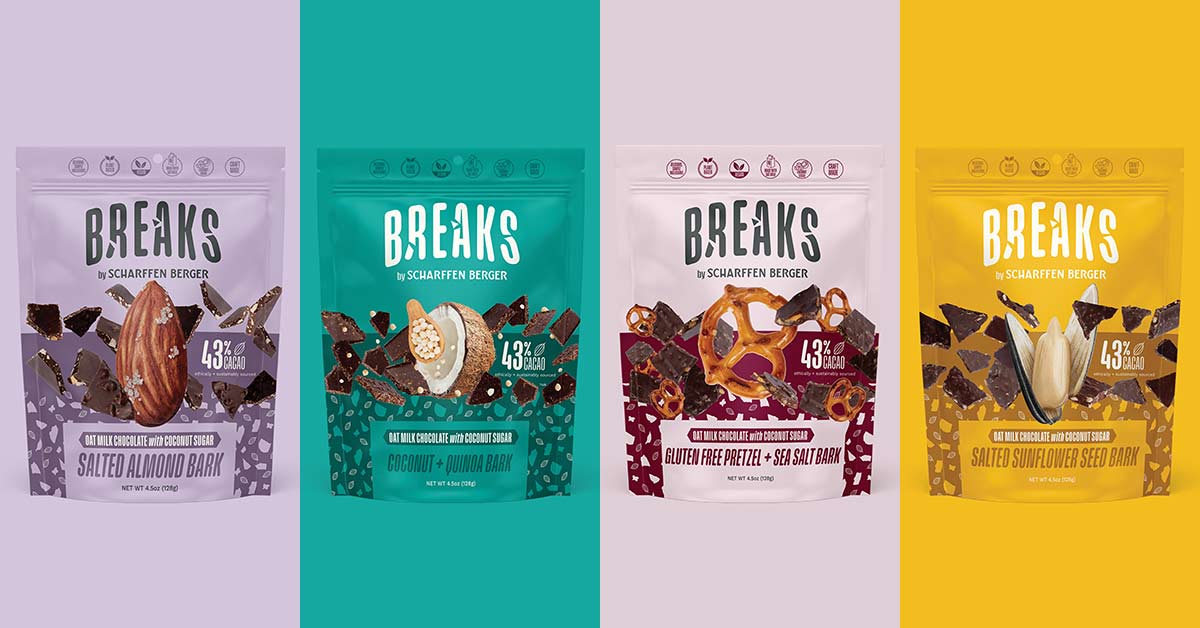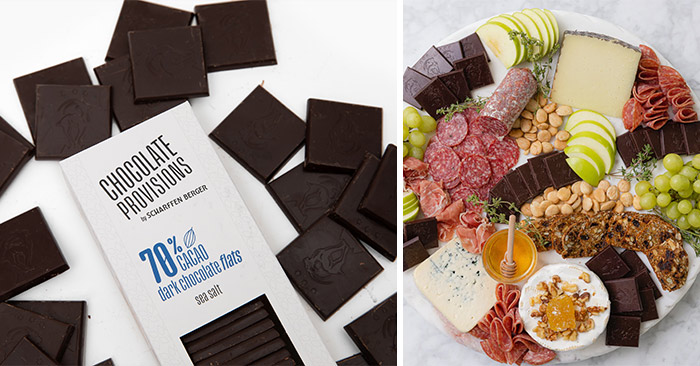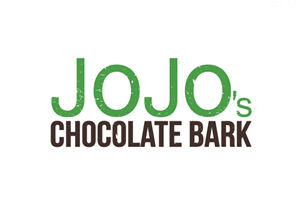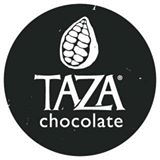Berger Does Bark: Former Hershey’s Brand Launches New Snack Line

Scharffen Berger is going deeper into snacking with the launch of BREAKS chocolate bark, offering the chocolatier and its president a chance to take on its former owner and employer, respectively.
Previewing at this week’s Sweets and Snacks Expo in Chicago, BREAKS is entering stores in 4.5 oz bags in four varieties: Salted Almond, Coconut and Quinoa, Salted Sunflower Seed, and Gluten-Free Pretzel. Listed at $5.99, all SKUs are vegan and made with 43% oat milk-based chocolate and coconut sugar. The line is expected to hit store shelves this fall.
“We have invested heavily in getting new products in the right package formats with on-trend ingredients, like plant-based oat milk, coconut and maple sugars and inclusions, up and running,” said JP Mackey, president and chief sales officer for Scharffen Berger, in a press release. “BREAKS is a perfect example of how we have been re-thinking this brand and where it can bring value for our retail customers while delivering on end-user consumer tastes.”
The BREAKS launch follows the February debut of sub-brand Chocolate Provisions. The chocolate thins, which are sold in 20-count boxes in retailers including Hyvee, Mollie Stone, New Seasons and Bristol Farms, are designed for entertaining occasions such as on charcuterie boards.

More than just new product lines, the launches represent an opportunity for Scharffen Berger to reclaim its position as category innovator.
Founded in 1996 by winemaker John Scharffenberger and Robert Steinber, Scharffen Berger sold to The Hershey Company in 2005 for a reported $50 million, at that time selling bars and baking aisle options including chocolate “chunks,” baking chocolate and cocoa powder. However, in 2020 Hershey CEO Michelle Buck announced plans to sell the company along with organic chocolate maker Dagoba and jerky line Krave, noting the three brands were outside of the company’s areas of expertise.
The subsequent 2021 sale to former Concord Confections president Paul Cherrie, with support from Hampton Road Capital, saw Scharffen Berger return to private ownership. Following the transaction, Scharffenberger rejoined as an advisor.
At the time of the deal, Cherrie told NOSH that the company had struggled under The Hershey Company, due to that team’s lack of experience in the baking aisle, the smaller size of the Scharffen Berger brand in relation to other Hershey’s properties and the previous departure of Scharfennberger.
Since the sale though, the company has worked to reinvigorate the brand under Mackey. Along with his appointment in late 2022, the brand debuted a rebrand with brighter colors, an emphasis on typography, and larger product callouts. The company also launched new bar skus with inclusions such as maple sugar, toasted coconut, cherries and salted almond and released new vegan chunks and began incorporating oatmilk. Even the company’s baking chocolate slabs were rethought, moving from a 9.7 oz single block to four 1 oz portions, in order to reduce consumer food waste, the brand said.
“The rising trend of consumers purchasing plant-based product alternatives and increase in Google searches for plant-based foods underscores the importance of providing these types of options for consumers across all food categories,” Mackey said in today’s release.
In the announcement Mackey also noted that the brand’s recent innovation pipeline as well as new branding represents the “innovation-meets-quality” strategy of the past, which is now being “resurrected by the current independent operators…to meet the tastes of today’s consumers as well as the broader needs of our current and future retail partners.”
The move into snacking is risky but could prove fruitful. According to data provided by the National Confectioners Association, the chocolate confection category brought in $23.9 billion last year, roughly $8.5 billion more than non-chocolate confection products and up 9.1% in dollar sales growth from the year prior. Chocolate confections often have higher velocities than products sold in the baking aisle, and are frequently purchased by consumers for themselves, in contrast to bars which are more often seen as a gifting item.
However, the category also brings with it an array of challenges, such as achieving those higher turns, and competition from large incumbents (Hershey owned BarkThins), other craft chocolatiers (Chauo and Taza), emerging brands (JoJo’s, Second Nature, Choc Zero and Seedly) and private label offerings (Target’s Favorite Day and Trader Joe’s).
Mackey finds himself back in the same category as two of his former employers: BarkThins, where he was VP of sales from 2012 to early 2015, and JoJo’s, where he held the titles of president and chief sales officer in 2021 for six months.
“Of course, bark lines are already out there,” Mackey acknowledges, “but with BREAKS, we have created a first-of-its-kind bark line that offers a plant-based solution with high-quality taste in familiar flavors.”




















